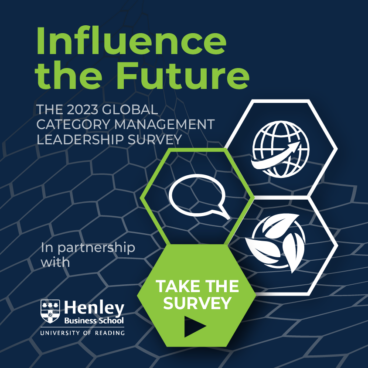
Podcast
Re-Thinking Procurement in 2023 | Jon Hughes Interview
Interview with procurement and supply chain expert Jon Hughes.
By Mark Webb |

Jon Hughes
Profile
35 years international business experience specialising in procurement change management.
Previous employment:
General Motors, British Steel, NWRMC, Co-Founder & Chairman of ADR Purchasing Consultants, Innovation Director for QP Group.
Education:
BA (Hons) and MA in Organisational Psychology, Cambridge University.
CIPS Fellow and holder of their Swinbank Award for Procurement Innovation.
Former Visiting Fellow at Birmingham University and the Vlerick Leuven Business School.
Role in FP: Chairman
Mark Webb, Managing Director, talks to Jon Hughes
In episode 1 of our 5-part podcast series on category management in procurement, Mark Webb, from Future Purchasing, interviews thought-leader Jon Hughes on procurement in the 1970 to early 1990’s and how a coffee break redefined his life.
Transcript
00:00:00:02 – 00:00:16:11
Mark Webb
John, thanks for joining me today. And it’s brilliant to catch up again. I just wanted to get some sort of background really about the history of category management because you were involved in it right from the start. So I wonder if we can wind the clock back X number of years and just back to where it all originated from really?
00:00:16:12 – 00:00:39:27
Jon Hughes
Not a problem Mark . Half my life is not going to flash passed my eyes. I think it was interesting. I was at university in the 1970s, studied social psychology, left university, went into automotive assembly and in those days as a social psychology graduate, you’d go down one of two routes. You either went into what we now call human resources, but which was then called the Labour Office, or you went into Buying.
00:00:39:27 – 00:01:00:26
Jon Hughes
The root of global procurement in those days was called the Buying Office and I spent time in both areas and I have to say I was massively unimpressed by what I saw in both groups in those days. Highly confrontational. If you worked in labour relations, it was about head on confrontation with trade unions, shop stewards and walk-outs to the car parks.
00:01:01:02 – 00:01:32:03
Jon Hughes
If you were on the other side in the sort of buying area, it was highly tactical negotiation, nailing suppliers to the floor. And that went through the 1970s and into the 1980s when I had an opportunity to work in what I wouldn’t call a business school, but which was then called the North West Regional Management Centre and I worked for three or four years in a commercial group and a human resources group basically doing a lot of lecturing, teaching, but also started to do some early consultancy. Clients would ask you to do a few things. Only low key though.
00:01:32:03 – 00:01:53:06
Jon Hughes
But we started doing a fair bit of work for a couple of companies and initially it was on competence development, it was training teams, particularly in procurement, but training teams in core skills. So the big leader was always negotiating skills coming up behind in a little of the analytics, things like purchase price and cost analysis, but again, fairly rudimentary.
00:01:53:06 – 00:02:10:11
Jon Hughes
And we had one client at that time, with whom we did a lot of training work and they would say, well, could we do more than this? Could we actually take procurement as a function, as a discipline, and do something with it? That led into really the first sort of major assignment that we kicked off in 1984.
00:02:10:11 – 00:02:43:13
Jon Hughes
And it became very, very apparent very early on that there was no process, there was no definition of how to do procurement, there was no data. No one even knew how many people worked in procurement. We didn’t know what the total expenditure was and everyone was away incredibly busy doing “purchasing”. In 1985 we did a main board presentation in London to this client and it really raised the whole status of – Why can’t we do this as a global initiative.
00:02:43:14 – 00:03:07:23
Jon Hughes
Now globalisation back in 1985 was still very much an emerging idea. I remember we did this presentation if you please with acetate slides, those slimy things you to sort of Letrasetted them or wrote with marker pens on them and it goes down there. You have the overhead projector whirring in the background with these slides. So we did this slide presentation.
00:03:07:23 – 00:03:23:27
Jon Hughes
You can see the main board, you know, their eyes closing with my God, this is so tedious that we stop for coffee and in fact is the best coffee break I’ve ever had in my life because it redefined my life. And over coffee, someone just said to me, Well, what is this procurement thing? And surely we’re doing it.
00:03:23:27 – 00:03:55:22
Jon Hughes
The client said we’re doing a good job. I just said to this board director, okay, let’s just test this. You’re an FMCG, fast moving consumer goods company. Do you know the top ten marketing directors worldwide? Oh, of course. I know them very well, what school they went to, which university, exactly what these people do. Okay, great, can you name your top ten procurement directors worldwide? And this guy looked at me and said I can’t name one. I then said, Jim, do you know how much money you spend in total with third party suppliers?
00:03:55:22 – 00:04:19:24
Jon Hughes
And he said, no, he had a guess. And I said, you’re out by 50%. And the finance director said, he’s right, you are out by 50%. So I said, you don’t know any of your key people. You don’t know how much you spend. Next question. How well do you think you’re spending the company’s money? And he just looked at me, and said I fear we’re crap.
00:04:19:24 – 00:04:43:18
Jon Hughes
That was it. So that was one episode. And at the same time, this company had two non-executive directors. One of them was a guy called Wickham Skinner, who was professor of manufacturing strategy at Harvard. A leading light. The second was a guy, Jean-Claude Larreche, who was professor of marketing at INSEAD in Paris. And they both were very, very interested indeed in this whole procurement area as a result of what we’re talking to them about.
00:04:43:22 – 00:05:09:18
Jon Hughes
Yeah. And the marketing guy just said, Oh my God, you know, the amount of money that you’re talking about, the potential leverage that the organisation must have, if we could focus and concentrate its expenditure would be absolutely enormous. Then the manufacturing guy said he was trying to develop an approach whereby manufacturing rather than just delivering products, would actually in some way be strengthening and shaping the whole way in which the company operated.
00:05:09:18 – 00:05:45:17
Jon Hughes
So we had this discussion going, which is we’ve got a manufacturing weapon, you’ve got your marketing weapon. Why on earth can’t you have procurement and suppliers aligned to both of these two key core competencies of the business? That was 1985. Over the last 40 years, I haven’t had that many discussions which have been that pioneering. And quite honestly, Mark, from then onwards, I just felt I knew exactly where my career was going to go because once we led that first procurement initiative, we not surprisingly had to make a lot of changes in the leadership community.
00:05:45:17 – 00:06:09:10
Jon Hughes
Unfortunately, far too many of the people on that side just didn’t really possess the skills and capabilities needed. So we brought in a lot of new procurement people, we poached them from other organisations and many of that group became a global network that I actually worked with for several decades. Those people went on to other organisations, they moved into other sectors.
00:06:09:10 – 00:06:30:20
Jon Hughes
They didn’t all stay in fast moving consumer goods. They became a network of people. I think they were a group of ardent enthusiasts. They said, we can change this whole function called procurement. And really I think from there it spiralled. Obviously back in those days if we’d had Google I could have looked up procurement category management over breakfast.
00:06:30:21 – 00:06:41:07
Jon Hughes
I did that today and there were 27 million hits on procurement category management. If there was such a thing back in 1985, we would have got zero.
00:06:41:07 – 00:07:00:26
Mark Webb
It’s amazing. And I mean, what prompted this really was talking to somebody in South America in a mining company and it’s all about category management. And it just made me think exactly about that by this sort of global ubiquity of this way of working. Certainly the sort of the brand of it, whether people are doing it, is another question in the way we might expect them to.
00:07:01:05 – 00:07:01:13
Jon Hughes
Yeah.
00:07:01:17 – 00:07:16:08
Mark Webb
Is definitely, you know, a cornerstone. Somebody referred to it to me recently as the procurement function. So it’s really putting that in place I guess in that sort of mid to late eighties period with some leading pioneering organisations, as you say, was the start point for it all?
00:07:16:08 – 00:07:37:24
Jon Hughes
I think it was. And again going back into the 1980s period, I mean there were ideas starting to be thought of quite a lot. I think very important business concepts were moving into common parlance. Innovation was becoming a big thing. The whole area of business strategy, business alignment, the notion that strategy can’t just be driven from the top, it’s got to actually embrace the whole organisation.
00:07:37:24 – 00:08:09:04
Jon Hughes
Gary Hamel was producing ideas of core competence, the nature of competency in organisations. You had the Japanese automotive assemblers coming into the UK in the 1980s, bringing with them Japanese manufacturing methodologies, total quality management, the whole ideational process, standardisation of processes, defined ways of working. Yes. So some very interesting ideas were surfacing. Procurement at that time though was still very much a follower, not a leader.
00:08:09:04 – 00:08:37:18
Jon Hughes
But I think there was a sense that if you if we could align procurements to what were becoming important business methodologies and business drivers, then you could be carried along in the slipstream, carried along the slope. I said, found that one of the absolute early messages for me was, whatever you do, don’t talk procurement, talk business. Whatever the business drivers are, whatever the business methodologies are, make sure that you absolutely dovetail in with them and are integrating with them.
00:08:37:18 – 00:09:02:06
Jon Hughes
Now again, category management, you know, back in the 1970s and 1980s, some low margin businesses were using commodity management. So that was already there. And obviously, you can see some very distinct parallels between commodity management and category management. Commodity management was very functional, very narrowly defined in purchasing terms. It had a very hard edge to it.
00:09:02:08 – 00:09:48:09
Jon Hughes
But if you went and talked to a marketing person and started talking about, you know, marketing media, marketing research as a commodity, they would throw you out of the room. Interestingly, one of our clients in that time, going back into the 1980s, had introduced something called marketing category management. What that was all about is that they knew they had global brands, they knew they had global marketing departments, the whole of marketing was actually organised locally and nationally, and they were struggling with how on earth to migrate from a very local, very fragmented, very decentralised operation into something that could manage the whole marketing space on a global level, but without centralising it.
00:09:48:09 – 00:10:13:03
Jon Hughes
Now, again, on to one of the big debates I have had with many people over the decades. There’s a huge difference, I think, between consolidation and centralisation. I think a lot of people believe that the natural view is that we must centralise. I don’t think that’s the issue. I think the question is how do you consolidate it? How do you get the benefits of the leverage locally, at the country level, at the country cluster level at a regional level on a global level?
00:10:13:03 – 00:10:35:13
Jon Hughes
And you can’t do all of that through the, you know, a single operating model. So using marketing category management steal with pride is one of my views. We just basically looked closely at marketing models and I said, why on earth can’t we do that in procurement? Why don’t we just take marketing’s global category management model and transform it into procurement category management?
00:10:35:16 – 00:11:02:28
Jon Hughes
And I wrote an article on that subject. It must have been around about 1992/1993. As far as I know, that’s the first time category management was ever referenced in the procurement space. So I think the whole piece of alignment connecting to the business, engaging the business, working with the business, you know, don’t work against the organisation’s operating model, work with it. This has always been an absolute sort of core mantra that I followed until till my retirement.
00:11:02:28 – 00:11:03:17
Mark Webb
Absolutely.

About Mark Webb
Managing Director
22 years procurement experience in line management
and consulting roles.
Previous employment: Price Waterhouse, Mobil Oil and QP Group
Education: BSc in Management Science and MSc in Business by Research, Aston University
CIPS: member


